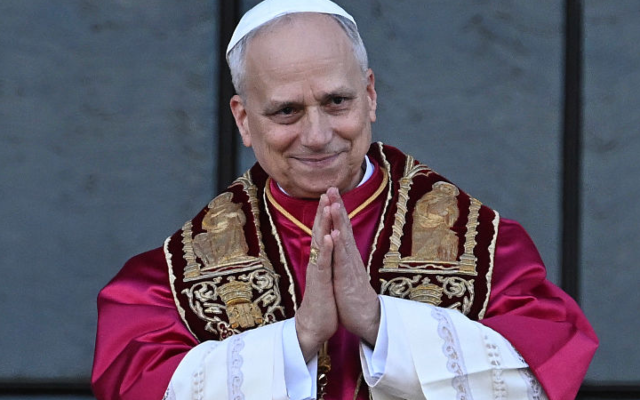Pope Leo XIV made his first public comments on Sunday regarding Christianity in China since becoming head of the Catholic Church, praying for the Virgin Mary to grant them the ability to be a “strong and joyful witnesses of the Gospel” in a country that actively persecutes all religions.
The pope made his comments in the context on publicly recognizing the Catholic World Day of Prayer for the Church in China, marked by the feast day of Our Lady, Help of Christians, one of the patroness figures of China. The Vatican has marked May 24 under that title since 2007, when Pope Benedict XVI proclaimed the date as a special day to pray for Chinese Christians.
Religious freedom experts estimate that China is home to one of the largest Christian populations in the world, totaling between 70 to 130 million people — potentially more than the number of confirmed members of the Communist Party. China aggressively represses all religions, and particularly Christianity, which is present in a geographically and ethnically diverse way in the country that makes it difficult to target.
“Yesterday, on the liturgical Memorial of the Blessed Virgin Mary Help of Christians, we celebrated the Day of Prayer for the Church in China, established by Pope Benedict XVI,” Pope Leo told congregants on Sunday following the leading of the Regina Caeli, a Catholic prayer traditionally sung. “In churches and shrines throughout China and around the world, prayers were offered to God as a sign of concern and affection for Chinese Catholics and their communion with the universal Church.”

Pope Leo added, May the intercession of Mary Most Holy obtain for them, and for us, the grace to be strong and joyful witnesses of the Gospel, even in the midst of trials, so that we may always promote peace and harmony.”
“With these sentiments, our prayer embraces all those peoples suffering because of war. Let us implore courage and perseverance for those engaged in dialogue and in the sincere search for peace,” he concluded.
The pope’s comments regarding communion with the Vatican are of particular note given the difficult relationship between the Holy See and the Chinese Communist Party. China only allows citizens to practice one of five legal religions: Catholicism, Protestant Christianity (the “Three-Self Patriotic Church”), Taoism, Islam, and Buddhism. All five “legal” forms of each religion, however, are strictly controlled by the Communist Party and its leaders allowed only to use the religions as vehicles for communist propaganda. Those who wish to attend those services face close surveillance and are forced to register on a government mobile phone application.
As a result, both official Catholic and Protestant churches are unpopular and many Chinese Christians opt for worshipping at home, which is illegal. Christians choosing to practice “house church” Christianity face extreme repression and violence including forced disappearances, torture, indoctrination, and in some cases death. In particular danger are priests and pastors who choose to follow true Christian beliefs and deviate from government-controlled worship.
The Chinese Catholic Church, controlled by dictator Xi Jinping, is not in communion with the Vatican. The Communist Party appoints its own “priests” and has for years demanded they be recognized on par with true Catholic clergy. The Church prior to the late Pope Francis had not recognized the Communist Party as a body with legitimate authority to ordain clergy, particularly of concern for the Catholic Church as it maintains the concept of apostolic succession: that its bishops can trace their ordination lineage back to the original Apostles of Christ, including Peter, the first pope. The Vatican had excommunicated Chinese regime “bishops.”
In 2018, however, Pope Francis brokered an agreement attempting to bring the rogue Chinese regime Church into communion with the Vatican that would recognize some communist “bishops” as legitimate, outraging Chinese Christians. Rather than reduce the amount of documented regime persecution of Christians in the country, the number of such incidents increased as Pope Francis moved to recognize the illegitimate authority of the Communist Party.
“The Vatican’s deal, struck in the name of unifying the Church in China, means the annihilation of the real Church in China,” Cardinal Joseph Zen of Hong Kong, one of Pope Francis’s most vocal critics, lamented following the passage of the agreement in 2018. Cardinal Zen traveled to the Vatican following the passing of Pope Francis and reportedly warned against needless “reform” that could damage the fabric and history of the Church. Multiple reports indicated following the election of Pope Leo that those participating in the Conclave were driven to choose him in part due to concerns that other candidates may be more likely to expand such agreements with China.
Pope Leo was not vocal on the issue of China prior to being elevated to run the Church, as an American who spent much of his career engaging in missionary work in Peru. He is known to have visited China, however, on multiple occasions since being ordained, a fact highlighted followed his election.
The Chinese government, despite reaching agreements with Pope Francis, offered only perfunctory condolences after his passing and did not send a representative to his funeral. Following Pope Leo’s election, the Chinese Foreign Ministry issued a statement indicating it is seeking more agreements to empower the Communist Party as an ordaining entity with the new papacy.
“We congratulate Cardinal Robert Prevost on his election as the new pope,” Foreign Ministry spokesman Lin Jian said in a briefing to reporters in early May. “We hope that under the leadership of the new pope, the Vatican will continue to have dialogue with China in a constructive spirit, have in-depth communication on international issues of mutual interest, jointly advance the continuous improvement of the China-Vatican relations and make contributions to world peace, stability, development, and prosperity.”



